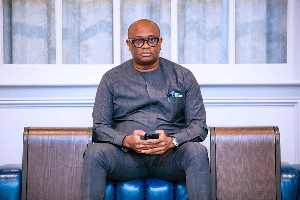Opinions of Thursday, 25 May 2017
Columnist: Gabla Godwin
African Union; its mandate, failure and what needs to be done
“I dream of the realisation of the unity of Africa whereby its leaders combine in their efforts to solve the problems of this continent. I dream of our vast deserts, of our forests, of all our great wildernesses.” Nelson Mandela HISTORY OF AFRICAN UNION
The African union is an integral aspect of the African unionism process which was championed by some of the well-meaning leaders of the countries within the African continent in those times.
Notable amongst them are the likes of Dr Kwame Nkrumah of Ghana, Modibo Keita of Mali, Gamal Abdul Nasser of Egypt, Sekou Touré of Guinea, Julius Nyerere of Tanzania, Ben Bella of Algeria, Emperor Haile Selasse of Ethiopia, William Tubman of Liberia, Abubakar Tafawa Balewa of Nigeria, Nnamdi Azikiwe of Nigeria, Jomo Kenyatta of Kenya and many others.
The African Union which was first formed on 25th May, 1963 in Addis Ababa – Ethiopia bore the name Organisation of African Unity (O.A.U). However, in the year 2002, Under the watch of the former South African President, Mr. Thabo Mbeki, the former name was disbanded giving rise to the new African Union (A.U). Currently, the association has a constitution of all 55 countries or states within the African Jurisdiction.
The African union had some mandates to achieve as an organisation in fostering the growth of Africa and promoting peaceful co-existence among African states.
OBJECTIVES
The OAU had the following primary aims:
? To co-ordinate and intensify the co-operation of African states in order to achieve a better life for the people of Africa.[1]
? To defend the sovereignty, territorial integrity and independence of African states.
? The OAU was also dedicated to the eradication of all forms of colonialism and white minority rule as, when it was established, there were several states that had not yet won their independence or were white minority-ruled. South Africa and Angola were two such countries. The OAU proposed two ways of ridding the continent of colonialism and white minority rule. Firstly, it would defend the interests of independent countries and help to pursue the independence of those still-colonised ones. Secondly, it would remain neutral in terms of world affairs, preventing its members from being controlled once more by outside powers.
A Liberation Committee was established to aid independence movements and look after the interests of already independent states. The OAU also aimed to stay neutral in terms of global politics, which would prevent them from being controlled once more by outside forces – an especial danger with the Cold War. The OAU had other aims, too:
? Ensure that all Africans enjoyed human rights.
? Raise the living standards of all Africans.
? Settle arguments and disputes between members – not through fighting but rather peaceful and diplomatic negotiation.
FAILURE
The African union has over the years supported its member states and proven to be a great force to reckon with when it comes to continental unity. Sadly, despite the efforts of this great organisation towards the success of all countries under its umbrella, we still live in an Africa where Xenophobia is on the rise. An Africa where corruption and bribery is seen as legal. It has become so bad that one is left to think corruption is taught in schools. We live in an Africa where we fear to live our properties at home and go to work. Who knows, the thieve might just be living next-door. We live in an Africa where poverty is a bushfire. Spreading so rapidly and painfully.
The African Union's mandate to settle disputes had to be questioned so many times when the association failed to resolve such issues despite having the necessary materials. This sometimes causes the intervention of countries from the West who only come with the hope of taking something precious away from the African. This could be seen in many previous instances of dispute in African nations. But for the width of the hair, a similar situation could have occurred in the Republic of Gambia earlier this year.
WHAT SHOULD BE DONE
I am of the view that a strong community needs a strong interpersonal bond. The African leaders must begin thinking like a community. They must begin asking questions as a community. They must begin finding answers as a community. This is Africa! Where we are all blacks! Blacks blessed with strong skins, solid black hairs and charming brains. Our leaders should begin to look at individual problems as a continental problem. With this, a collective effort, we can wipe out some of these retardations and minimise others.
Africa can work! Africa can rise! Africa can lead the world! So I end this with a quote by Dr. Kwame Nkrumah “ it is far easier for the proverbial camel to pass through the Needle's eye, hump and all than for an erstwhile colonial administration to give sound and honest counsel of a political nature to its liberated territory”
Happy Birthday, African Union!
Long Live African Union
Long Live Africa!














